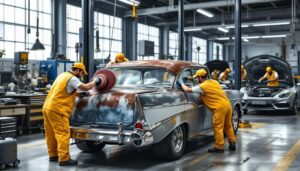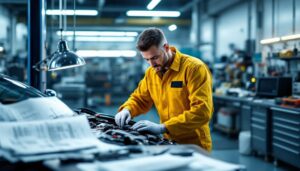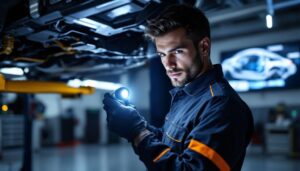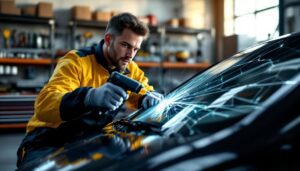Accidents happen. But when they do, knowing how to handle the aftermath can make a big difference in both your safety and your wallet. While the visible damage on your car, like dents or broken glass, is easy to spot, what you don’t see can be even more critical. Mechanical repairs after a collision are often more complex than just cosmetic fixes. From suspension issues to drivetrain misalignments, hidden mechanical damage can impact performance, safety, and even long-term costs if not addressed promptly.
Understanding what goes into mechanical repairs after a collision equips you to ask the right questions, make informed decisions, and keep your car in top shape.
Jump to:
TLDR – Quick Guide
- Collision damage can affect more than just the exterior. Mechanical systems, such as the suspension, steering, and drivetrain, often take a hit.
- Hidden damage can impact safety. A thorough inspection ensures that unseen problems, like frame misalignments or damaged electronics, don’t go unnoticed.
- Choose a certified repair shop. Reputable collision centers are essential for accurate diagnostics and quality repairs.
- Insurance coverage may vary. Confirm with your insurer about mechanical repairs to avoid unexpected costs.
- Follow up with a test drive. Post-repair road tests confirm that repairs were successful and your car handles as it should.
Detailed Breakdown
1. Why Mechanical Repairs Are Crucial After a Collision
After a collision, some damage is obvious. But even minor accidents can disrupt critical systems that are hidden from view. Damage to the steering, suspension, brakes, or transmission can compromise your car’s handling and safety. This is why a comprehensive diagnostic check is essential after an accident. Skilled technicians use specialized tools and diagnostic software to detect damage in areas that aren’t visible.
Common Mechanical Damages Post-Collision:
- Suspension Misalignment: Impacts handling and tire wear.
- Braking System Damage: Compromises stopping power and response time.
- Transmission and Drivetrain Issues: May cause strange noises, shaking, or issues with gear shifts.
- Electrical and Sensor Damage: Impacts safety features like airbags, ABS, and traction control.
2. Key Mechanical Repairs Needed After a Collision
Different accidents impact vehicles in various ways, but here are some typical repairs that often follow a collision:
- Wheel and Suspension Alignment
After an impact, alignment issues can cause uneven tire wear, reduced control, and a shaky ride. Realigning the suspension restores the vehicle’s handling and steering. - Brake System Inspection and Repair
Even if your brakes seem fine, an inspection is critical. Damage to brake lines, rotors, or calipers can reduce stopping power, making your vehicle unsafe. - Drivetrain and Transmission Check
Rear- or front-end collisions often cause drivetrain damage. If left unaddressed, this can lead to costly repairs down the road and even complete transmission failure. - Electrical Systems Diagnostics
Your vehicle’s sensors, wiring, and computer systems are vulnerable in a crash. A diagnostics check ensures systems like airbags and traction control are functioning correctly. - Cooling System Repairs
A front-end collision can harm the radiator or cooling system, leading to potential overheating if not fixed immediately.
3. How to Choose the Right Repair Shop for Post-Collision Work
Picking the right repair shop is essential. Not all mechanics are equipped to handle collision-related mechanical repairs, and choosing a certified collision repair center makes a difference. Certified centers have technicians trained to inspect, diagnose, and repair damage using manufacturer guidelines, which is key for both safety and insurance purposes.
Qualities to Look For:
- Certification from Reputable Organizations (e.g., ASE, I-CAR Gold Class)
- Manufacturer Approvals for your specific vehicle brand
- Transparent Estimates that cover all potential repairs, including hidden damage
- Insurance Assistance to help with claims, so you don’t have to handle everything on your own
4. Does Insurance Cover Mechanical Repairs?
Coverage for mechanical repairs depends on your policy. Most comprehensive or collision insurance plans will cover repairs directly related to the accident, but it’s essential to confirm with your insurer. Ask specific questions, such as:
- Does my policy cover mechanical repairs post-collision?
- Are there any limits on what parts or systems are included?
- Will aftermarket or OEM parts be used in the repair?
Knowing this in advance can help you avoid unexpected out-of-pocket expenses.
5. The Importance of a Post-Repair Test Drive
After repairs, it’s crucial to conduct a test drive. Not only does this help you ensure that the vehicle is operating smoothly, but it’s also an opportunity to notice any remaining issues. Pay attention to how the car handles, listen for any unusual sounds, and check the responsiveness of the brakes and steering.
Key Takeaways
- Inspect Beyond the Surface: Mechanical issues post-collision are often hidden, making a thorough inspection essential for safety and performance.
- Work with Certified Technicians: Quality repairs are best handled by certified mechanics, who have the tools and expertise to address complex mechanical damage.
- Know Your Insurance Policy: Understand your coverage to avoid unexpected costs for mechanical repairs.
- Take a Test Drive: Confirm that all repairs were successful by conducting a post-repair test drive.
FAQs
1. What mechanical issues should I look out for after a minor accident?
Even a small accident can misalign your wheels, damage the suspension, or cause brake problems. It’s wise to have these systems checked to ensure safety and prevent long-term issues.
2. Will my insurance cover mechanical repairs after a collision?
Most comprehensive insurance policies cover collision-related mechanical repairs, but it’s essential to review your specific policy details or contact your insurer to confirm.
3. Can I drive my car if it’s only visibly damaged?
It’s risky to assume a car is safe based on visible damage alone. Even if the car looks okay, unseen mechanical damage can affect handling, safety, and reliability.
4. How do I know if a repair shop is qualified for collision-related repairs?
Look for repair shops certified by ASE or I-CAR, and ask if they have manufacturer approvals for your vehicle brand. Certified centers use recommended practices and parts, ensuring the quality of repairs.
5. Why is a test drive important after collision repairs?
A test drive helps verify that repairs are complete and that the vehicle handles properly. It allows you to detect any lingering issues before getting back on the road.







